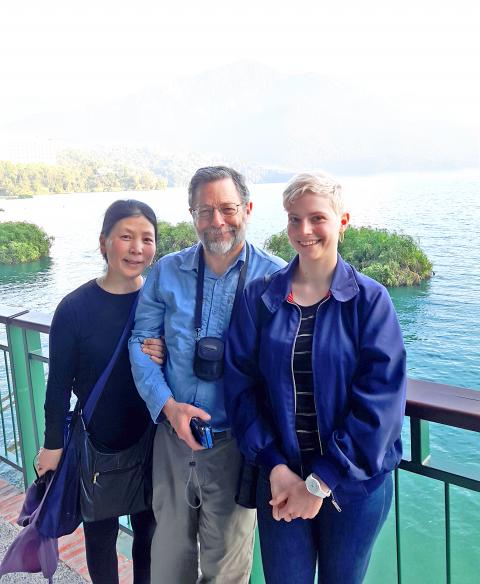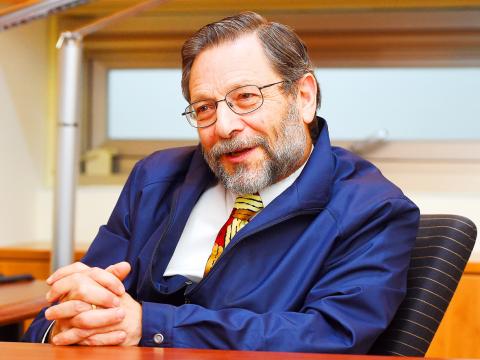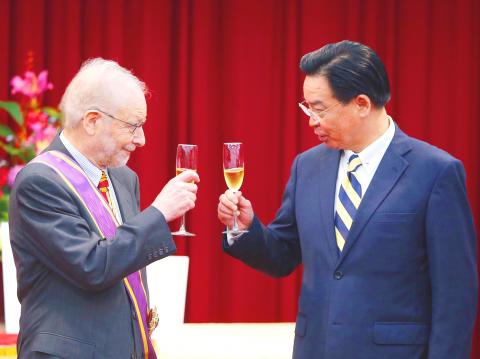J. Bruce Jacobs, the American-born Australian academic who was a giant of Taiwan scholarship, recipient of top civilian awards from the Taiwanese and Australian governments and a regular Taipei Times contributor, died yesterday afternoon in Melbourne after a years-long battle with cancer, a friend of the family told the newspaper.
The 76-year-old Jacobs first came to Taiwan in 1965 as a postgraduate student in history at National Taiwan University after earning his bachelor’s degree from Columbia University. He returned to Columbia in 1966 to pursue a master’s degree, which was awarded in 1970, and then returned to Taiwan in 1971 to conduct research for his doctorate, staying until 1973.
After earning his doctorate from Columbia in 1975, Jacobs in 1976 became a lecturer in politics at La Trobe University in Melbourne, going on to become chair in Asian studies in 1988 and founding director of its Institute of Asian Studies the following year.

Photo courtesy of Martin Williams
He also taught at Nanjing University in the late 1980s.
In 1991, he was hired by Monash University as a professor of Asian languages and studies, and over the years held several leadership positions in that department, including as director of its Taiwan Research Unit.
In 2014, he became emeritus professor of Asian languages and studies at the university.

Photo: Liao Chen-huei, Taipei Times
In addition to his research and writings on Taiwan and China, Jacobs earned his own footnote in Taiwanese history after the Feb. 28, 1980, murders of the mother and twin daughters of then-jailed provincial assemblyman Lin I-hsiung (林義雄) and the attempted murder of his third daughter, while Lin was jailed awaiting trial on charges of insurrection for helping organizing the Dec. 10, 1979, demonstration against the then-Chinese Nationalist Party (KMT) government, an event that became known as the Kaohsiung Incident.
Jacobs was a friend of the family and although Lin’s home in Taipei was under 24-hour surveillance, the government accused Jacobs of being involved in the murders and he was placed under “police protection” for three months and barred from leaving Taiwan.
After he was allowed to return to Australia, he was placed on the KMT government’s blacklist and barred from returning to Taiwan for 12 years.

Photo: CNA
Jacobs wrote about the experience in his 2016 book, The Kaohsiung Incident in Taiwan and Memoirs of a Foreign Big Beard, a reference to his local nickname, “Big Beard.”
On Nov. 16 last year, Minister of Foreign Affairs Joseph Wu (吳釗燮) awarded Jacobs the Order of Brilliant Star with Grand Cordon at a ceremony at the Ministry of Foreign Affairs in Taipei in recognition of his contributions to democratization and human rights in Taiwan.
Wu said that Jacobs had not only made “exceptional contributions to the people of Taiwan,” but was also “part of Taiwan’s history.”
On June 10, Jacobs was made a Member of the Order of Australia for his significant service to higher education, particularly in the field of Asian studies.
Jacobs’ wife, Kim Jung-sim, and his daughters Melanie, Ruth and Stephanie, were with him when he died at the family home, the Taipei Times’ source said.

DAREDEVIL: Honnold said it had always been a dream of his to climb Taipei 101, while a Netflix producer said the skyscraper was ‘a real icon of this country’ US climber Alex Honnold yesterday took on Taiwan’s tallest building, becoming the first person to scale Taipei 101 without a rope, harness or safety net. Hundreds of spectators gathered at the base of the 101-story skyscraper to watch Honnold, 40, embark on his daredevil feat, which was also broadcast live on Netflix. Dressed in a red T-shirt and yellow custom-made climbing shoes, Honnold swiftly moved up the southeast face of the glass and steel building. At one point, he stepped onto a platform midway up to wave down at fans and onlookers who were taking photos. People watching from inside

A Vietnamese migrant worker yesterday won NT$12 million (US$379,627) on a Lunar New Year scratch card in Kaohsiung as part of Taiwan Lottery Co’s (台灣彩券) “NT$12 Million Grand Fortune” (1200萬大吉利) game. The man was the first top-prize winner of the new game launched on Jan. 6 to mark the Lunar New Year. Three Vietnamese migrant workers visited a Taiwan Lottery shop on Xinyue Street in Kaohsiung’s Gangshan District (崗山), a store representative said. The player bought multiple tickets and, after winning nothing, held the final lottery ticket in one hand and rubbed the store’s statue of the Maitreya Buddha’s belly with the other,

‘NATO-PLUS’: ‘Our strategic partners in the Indo-Pacific are facing increasing aggression by the Chinese Communist Party,’ US Representative Rob Wittman said The US House of Representatives on Monday released its version of the Consolidated Appropriations Act, which includes US$1.15 billion to support security cooperation with Taiwan. The omnibus act, covering US$1.2 trillion of spending, allocates US$1 billion for the Taiwan Security Cooperation Initiative, as well as US$150 million for the replacement of defense articles and reimbursement of defense services provided to Taiwan. The fund allocations were based on the US National Defense Authorization Act for fiscal 2026 that was passed by the US Congress last month and authorized up to US$1 billion to the US Defense Security Cooperation Agency in support of the

HIGH-TECH DEAL: Chipmakers that expand in the US would be able to import up to 2.5 times their new capacity with no extra tariffs during an approved construction period Taiwan aims to build a “democratic” high-tech supply chain with the US and form a strategic artificial intelligence (AI) partnership under the new tariffs deal it sealed with Washington last week, Taipei’s top negotiator in the talks said yesterday. US President Donald Trump has pushed Taiwan, a major producer of semiconductors which runs a large trade surplus with the US, to invest more in the US, specifically in chips that power AI. Under the terms of the long-negotiated deal, chipmakers such as Taiwan Semiconductor Manufacturing Co (TSMC, 台積電) that expand US production would incur a lower tariff on semiconductors or related manufacturing